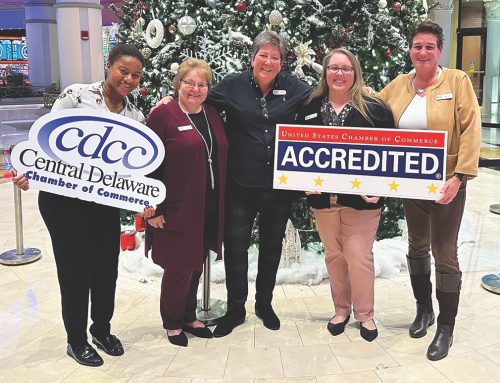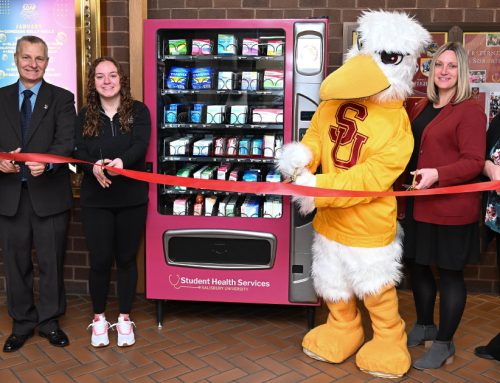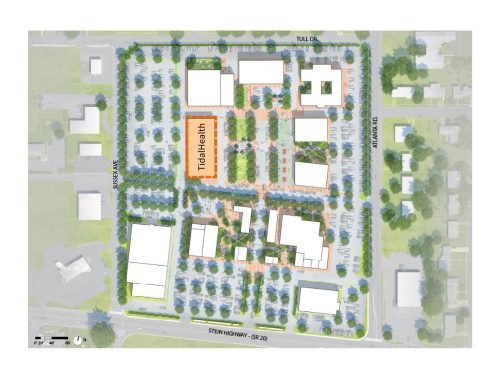If you’re coping with a cancer diagnosis you may feel overwhelmed, but one thing is certain: you do not need to travel far from home for world-class care.
 With treatment offered in Salisbury, Seaford and Ocean Pines — and a surgical team to provide care as needed — TidalHealth’s Richard A. Henson Cancer Institute and Allen Cancer Center offer the most advanced care on the Shore.
With treatment offered in Salisbury, Seaford and Ocean Pines — and a surgical team to provide care as needed — TidalHealth’s Richard A. Henson Cancer Institute and Allen Cancer Center offer the most advanced care on the Shore.
TidalHealth boasts an expanded research department that gives patients access to the latest clinical trials; a surgical robot that improves precision and reduces pain; high-tech radiation equipment that preserves healthy tissue and reduces treatment times; and a unified healthcare team that creates individualized care plans and embraces the latest treatment methods.
Advanced technology
Cancer patients in Sussex County now have a treatment option that is quicker and more precise.
Stereotactic body radiotherapy (SBRT), a painless, non-invasive procedure that uses highly focused beams of radiation to destroy tumors in the body in three to five treatments, is now offered at the TidalHealth Allen Cancer Center in Seaford.
SBRT is typically used for isolated small tumors where the accuracy of the technique can be fully utilized. In the cases where it’s applicable, SBRT allows the patient to finish treatment in one to two weeks, which is considerably shorter than standard radiation treatment plans. Reducing treatment time also helps to ease barriers that patients face in receiving their care.
“SBRT uses linear accelerator driven radiation beams that deliver a high dose per treatment to obliterate the tumor while also conforming tightly to the tumor target to reduce the impact on surrounding normal tissue,” said John Mansueti, MD, TidalHealth’s Executive Medical Director of Cancer Services. “We strive to provide the best quality of care for our Seaford community, and the state-of-the-art SBRT treatment technique helps to achieve this mission.”
Clinical research
For the past 18 years, TidalHealth has been building a robust research department and forging relationships with the Johns Hopkins Clinical Research Network and national cooperative groups for participation in clinical trials.
Each patient enrolled in a clinical trial has a coordinator and/or nurse who facilitates their care, helps them understand the clinical trial process and follows up with them throughout the experience.
Clinical trials are strictly regulated by the federal government to ensure they meet the highest scientific and ethical standards.
So, how do you know if a clinical trial is right for you?
Talking it over with your physician is a good first step; TidalHealth’s clinical research team works with doctors throughout the region to help get patients into appropriate trials.
Integrated care
As a result of its dedication to offer standardized, patient-centered care, TidalHealth has been designated an Integrated Network Cancer Program by the American College of Surgeons Commission on Cancer.
All TidalHealth locations use the same Electronic Medical Record, enabling patients to access their records from any affiliated office. One medical director oversees radiation oncology for all three locations, and another physician has oversight over medical oncology at all three sites.
Combined cancer conferences ensure the lines of communication are always open, and that all TidalHealth cancer experts review cases together to ensure the best outcome.
To learn more about cancer care at TidalHealth, visit tidalhealth.org/cancer.
Surviving breast cancer
My name is Alison Cernava, and I am a breast cancer survivor.
 I was diagnosed with breast cancer at the age of 40. I didn’t have my mammogram right away because I found out I was pregnant. At 19 weeks, I miscarried and delivered my daughter on Oct. 2, 2021. Before I went back to work, I decided to have my mammogram. The office staff called me that afternoon and told me I needed to come in for an ultrasound and then later that week I had to have a biopsy. On Nov. 1, 2021, four weeks after I miscarried, I was diagnosed with invasive ductal carcinoma Stage 2 in my left breast.
I was diagnosed with breast cancer at the age of 40. I didn’t have my mammogram right away because I found out I was pregnant. At 19 weeks, I miscarried and delivered my daughter on Oct. 2, 2021. Before I went back to work, I decided to have my mammogram. The office staff called me that afternoon and told me I needed to come in for an ultrasound and then later that week I had to have a biopsy. On Nov. 1, 2021, four weeks after I miscarried, I was diagnosed with invasive ductal carcinoma Stage 2 in my left breast.
Breast cancer was the last thing I thought I would be diagnosed with since I didn’t have any family history. The next two weeks consisted of several medical appointments and discussion about next steps. I started chemotherapy 17 days after I was diagnosed. Because I had an aggressive type of cancer, I began an aggressive treatment plan that consisted of chemotherapy and immunotherapy. After I finished chemotherapy, I chose to have a double mastectomy.
Throughout my entire treatment, I tried to stay positive; I truly believe having positive thoughts made all the difference in the world. I couldn’t have done this without the support of my family, friends, co-workers, and the staff at TidalHealth. Having a team of doctors and nurses that you trust makes the entire process easier. I always felt like the staff cared; I wasn’t just another person with breast cancer.
To learn more about cancer services at the TidalHealth Allen Cancer Center, visit tidalhealth.org/cancer or call 302-628-6344.




